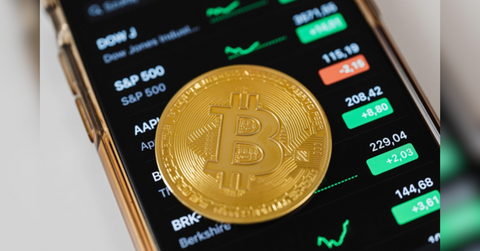Are Bitcoin Winnings Tax-Free In The US? What Players Need to Know

Oct. 1 2025, Published 1:10 a.m. ET
Bitcoin is no longer a niche investment, but it is a usual method by which people in America gamble online. Casinos, poker, and sports bet apps now allow players to deposit and withdraw in crypto, and in many cases, faster than traditional payment systems do. However, with the excitement of winning, there is a more practical concern: what does the IRS say about Bitcoin gambling winnings?
The response is simple: they are not tax-free. Bitcoin wins are taxed by the US government in the same manner as cash. When you win, you pay tax, whether the coins remain in your casino wallet, or you take them to an exchange, or sell them afterwards.
The IRS View of Bitcoin Gambling.
In gambling, there is no special treatment of Bitcoin by the IRS. The same applies to a cash jackpot, where you have to declare your winnings as taxable income. The distinction is that when it comes to crypto, you pay taxes on the fair market value of the coins that you win at the time.
An example is that you won a blackjack of 0.02 BTC when Bitcoin was trading at $50,000. That is a thousand-dollar gambling revenue, and that is what you claim on your tax return. And even later, when Bitcoin can increase or decrease in value, it does not alter your initial taxable income.
This is where crypto brings in an additional step to consider. After you later sell, trade, or convert such winnings, you will also have to report any gains or losses. The second step, which is capital gains or losses, occurs independently of the gambling income itself.
The IRS does not simply consider the size of your win when you gamble with Bitcoin in the US: it will also consider what you do with your crypto next. The amount of your winnings when they come to you is taxable income, and should you later sell or trade the same coins, any gain or loss in the value of the coins will be capital gain or loss. This is why players must be able to follow up both on the initial win and any subsequent exchange with great accuracy.
(Source: https://bitcoingamblingsites.com/).
Winnings as a US Player
Although your casino may not send you a tax form, you are not relieved of the hook. All gambling winnings should be reported to the IRS regardless of whether they were in dollars, Bitcoin, or any other token.
The players should be aware of the following in reporting:
Reporting of income: Schedule 1 (Form 1040) under Other Income.
Crypto transactions: Future sales or win conversions will need Form 8949 and Schedule D to record the gains or losses.
Losses: Deductions of gambling losses are only allowed to the extent of gambling income that you have reported and only when you are itemizing deductions.
Withholding: Certain big wins can automatically withhold, yet even without such cases, you will have to personally report.
The IRS clarified the fact that the lack of such a form as W-2G does not imply that winnings are tax-free. You will have to report it in case you win it.
Why Record-Keeping Matters
The volatility of crypto renders proper record-keeping a necessity. You won 0.05 BTC in May when it was valued at $3,000. The 0.05 BTC would be equivalent to the equivalent of $4,500 by December. If you report gambling income of $3,000 during the year, and you sell the same during December, you need to report a capital gain of $1,500, as well.
It is almost impossible to remain accurate without the dates, values, and transaction IDs tracking. Players are supposed to be aware of:
When they won.
How much they won in crypto.
What then was the value of that crypto?
At the time, it was sold or exchanged for the future.
The gain or loss at that point.
Gamblers of crypto should keep in mind that every detail matters, whether it’s a small win on a slot game or even buying Bitcoin with a credit card. All of this information can be logged with the help of software or spreadsheets. Small victories add up, and not reporting them can lead to penalties and interest down the road.
Common Misconceptions
Many players believe Bitcoin winnings are different from cash. Two myths come up often:
1. “If I don’t cash out, I don’t owe taxes.”
Not true. The taxable event happens the moment you win, based on the coin’s value that day—even if you leave it untouched in your casino wallet.
2. “Crypto isn’t money, so it doesn’t count.”
The IRS considers crypto property, and they’ve been clear that property winnings are taxable. It doesn’t matter that it’s not cash.
These misunderstandings can lead players to underreport. The IRS, however, has invested heavily in tracking cryptocurrency activity, making awareness and cryptocurrency education more important than ever. Failing to declare winnings carries real risks, from fines to audits.
What Players Need to Do
For US gamblers, the rules are strict but manageable. Here are the basics to stay compliant:
Report all gambling winnings in Bitcoin, no matter the size.
Keep track of the coin’s value at the time of the win.
Declare any capital gains or losses when disposing of the coins later.
Save records: exchange statements, wallet logs, and casino transaction histories.
If in doubt, consult a tax professional familiar with cryptocurrency.
These steps protect players from future IRS issues. They also make tax season smoother, since you won’t be scrambling to figure out what you won nine months earlier.

The Bottom Line for US Players
Bitcoin gambling has become an exciting way to play, offering speed, global reach, and the chance to hold onto winnings in a currency that might rise in value. But that upside doesn’t erase tax obligations.
For US residents, the rules are simple: if you win in Bitcoin, it’s taxable. And if you later sell, trade, or cash out, that’s another taxable event. Winning feels great, but winning with crypto means keeping your paperwork in order, too.
The information provided in this article is for general informational purposes only. Gamble or play responsibly. If you or someone you know has a gambling problem, help is available. Call 1-800-GAMBLER. If you’re in the U.K. and need help with a gambling problem, call the National Gambling Helpline on 0808 8020 133 or go to gamstop.co.uk to be excluded from all UK-regulated gambling websites. We disclaim any liability for any loss or damage arising directly or indirectly from the use of, or reliance on, the information presented.


